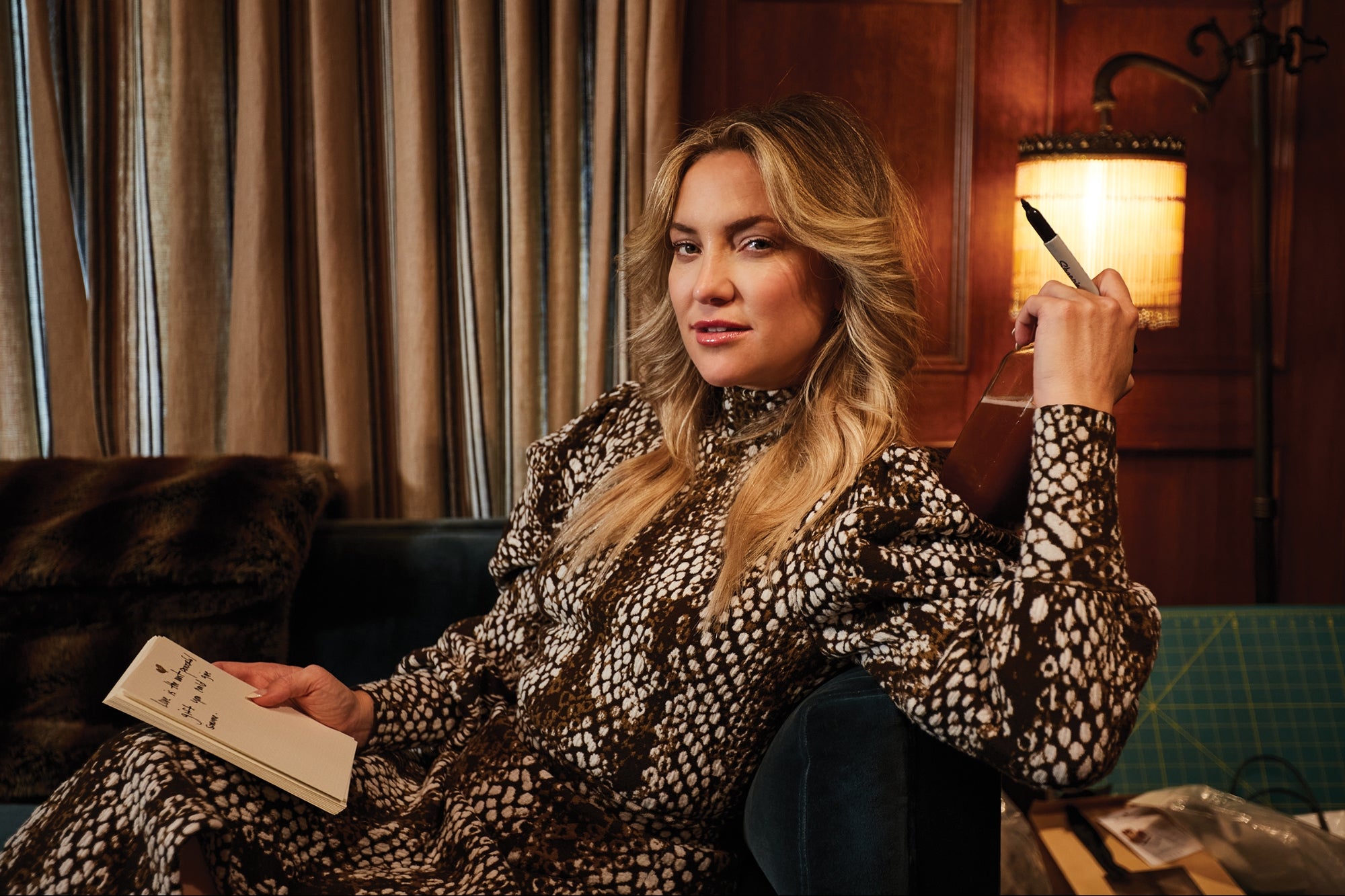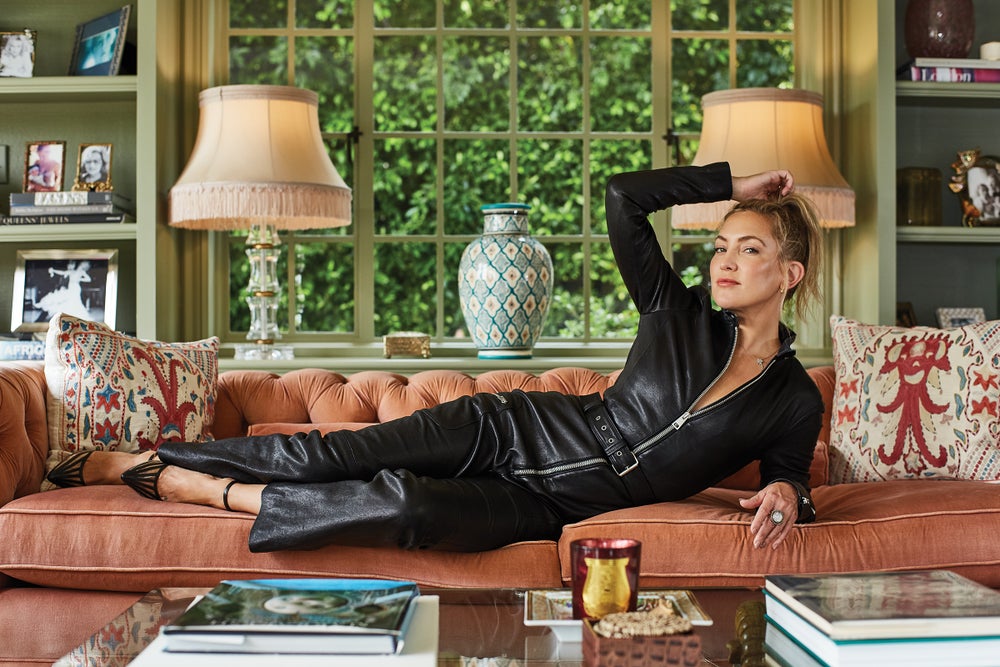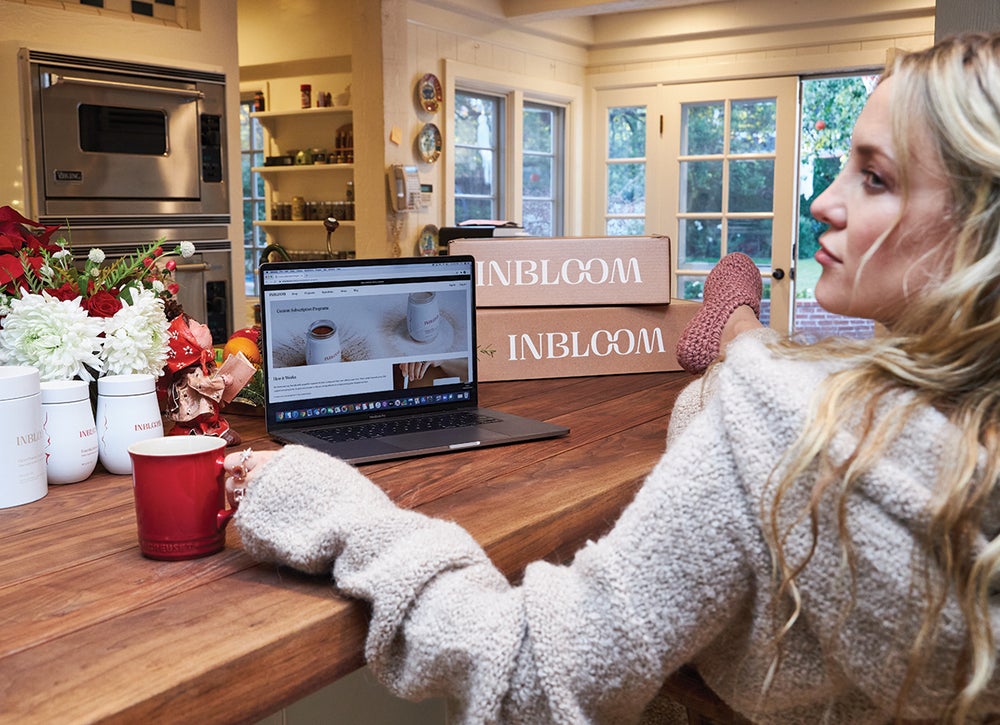How Kate Hudson Cut Through the Noise to Promote Sustainability: 'I'm Frustrated Too, But We're Doing This For a Reason' The actress has launched three businesses in very crowded industries but knows what separates her from the competition: It's not just the products. It's the mission.
By Alyssa Giacobbe Edited by Frances Dodds
This story appears in the July 2021 issue of Entrepreneur. Subscribe »

Entrepreneurs love taking "no" as a challenge, as if the right combination of savvy and stubbornness can overcome any obstacle. It's why, against the odds, Kate Hudson went after an elusive herb called amla.
This happened early into Hudson's latest business, InBloom, a line of plant-based powdered supplements she launched in August 2020. The amla plant is native to India and believed in Ayurvedic medicine to promote overall wellness and longevity, and Hudson's team had spent months working on the formula for an amla-packed, immunity-boosting blend they hoped to introduce later this year. It had to fit all her criteria — safe, sustainably farmed, good tasting, easily dissolved in liquids, and "bioavailable," the wellness industry buzzword for "It'll work." But try as they might, they couldn't overcome a fact of nature: Amla is a seasonal crop, and even in the best of times, there is only so much of it to go around. No supplier could help them. That meant no amla, which meant her team had to reformulate everything, which meant a months-long product delay, which meant Hudson had to accept a less glamorous but equally true entrepreneurial ethos: Sometimes you just need to move on…for now, anyway.
Related: How to Make Sustainability More Than a Buzzword
"It's not over," she says. "In the back of our minds, we're like, We're gonna get that plant one day. We're gonna get it."
Hudson is, of course, known best for her Hollywood pedigree — an accomplished actor, daughter of Goldie Hawn. But she is also an experienced brand builder. She launched the activewear line Fabletics in 2013, the gluten-free vodka King St. Vodka in 2019, and now InBloom. With each, she has become more comfortable riding the unpredictability of business and turning shortcomings into strengths. Early this year, for example, InBloom faced its first major supply shortage and sold out of several of its SKUs, including its two most popular. Hudson's Instagram comments were full of people asking when their favorite would be back, which stressed her out. So she had frequent calls with her cofounder and CEO, Tushar Adya, and then posted regular updates to her customers on Instagram — using the opportunity to educate people on how the products are made, the care with which the plants are grown and harvested, and so on. Eventually, she came to realize how even a stumble can be an opportunity to fulfill a brand's mission.
"My whole thing is: How do we democratize wellness? How do we get people to understand it? And how do we make it sustainable?" she says now. "Because in this world, there's so much waste. You think something is supposed to be recyclable, but you have to take it to a special place to actually do it. The bags they say are biodegradable aren't. Or you have to compost them, and how many people are really doing that? To be successful, we need to educate consumers about why they want what we want. Why everything will take longer. Why I'm frustrated, too, but we're doing this for a reason."

As far back as the late '90s, brands approached Hudson with opportunities — some collaboration offers but mostly endorsements. She promoted brands for a while (and still does, including WW, formerly Weight Watchers), but few of them felt right. "I love performing, but I'm not a model, and I always felt uncomfortable talking about a product when often I had no understanding of it," she says. She remembers working with the cosmetics brand Almay and saying, "I can't do this hair-flip moment, but tell me about the product." "And when we started talking about how Almay started," Hudson says, "and that this man created it for his wife, there was this amazing light bulb moment. Finally, it felt authentic. I was like, OK, I can do this. But also, I want to build a business I can really speak to. I want to be the guy creating the product for his wife."
Launching Fabletics was a risk; athleisure was a crowded space dominated by national brands, and Hudson had no experience in it. But she started to wonder: If she bet on herself, what would be the downside? "Actresses and actors in my position were endorsing, but they were not founding businesses," she says, citing Jessica Alba and Gwyneth Paltrow as the exceptions, and her mentors. "But then I thought, you know, I've wanted to do something in fashion. I've wanted to do something in healthy lifestyle. So I kind of put it all together and realized, Maybe this is exactly what I want to be doing." She also wanted to do something affordable, in the category her CEO Adya calls "mass aspiration," which meant finding a business model that could keep costs low.
In solving these problems, Hudson learned an important lesson: A brand can be differentiated by more than just the product. Her athleisure was cute and affordable, but other brands could claim the same. Fabletics ultimately clicked with consumers because of its sustainability model. Fashion brands can be wasteful; the excess materials pile up, and out-of-season models get trashed. Fabletics led with a different vision. It uses recycled packaging and shipping materials, as well as sustainably sourced clothing materials. It launched with a subscription model that enabled it to keep inventory low, and as it opened brick-and-mortar locations (it has 52 now), it built them to be carbon neutral. And it did all this while keeping costs modest.
That experience became a guiding insight for InBloom. The concept — supplements in powder form — came out of Hudson's own fear of taking pills, which she has had since she was 10, when she choked on a Fireball and had to get the Heimlich from a stranger in a CVS. ("It popped out of my mouth like a cartoon," she says.) But she knew she'd need more than that to compete in a category so large that it's expected to reach $349 billion by 2026. Then Hudson noticed an opening: Most supplements were crazy-expensive to make — and also to buy — and offered little transparency regarding ingredients. Many were full of synthetics, or claimed to be natural but weren't, which left consumers distrustful and confused. This meant that trust, in addition to product, could be her differentiator.
Hudson looked for a while to find partners who were on board with how seriously she took the idea of affordable, and sustainable, wellness. Eventually, she found it in Adya, a cofounder of a brand incubator called Syllable. On choosing a partner, Hudson says she follows what she calls "the no-asshole rule" because "there's nothing worse than being in business with people who really aren't very fun and don't have a good moral compass." A good partner also has to be OK with her constant involvement (and sometimes obsessive calling). "They have to be ready for me to roll up my sleeves," she says. "Sometimes people don't think that that's how you're going to be. They think you're going to hide behind your people and that you just want to be the face of something. But I would take the investment over the dollar any day."
Related: What You Can Learn From the Rise of Sustainability-Focused Entrepreneurship
InBloom launched right in the middle of the pandemic, with five SKUs and a bang, quadrupling its sales in the first few months alone, thanks in large part to Hudson's 13.3 million social media followers and the attention she pays to them. Her Instagram posts are a master class in personal branding. They're a mix of the purely personal and those that serve to promote her businesses, with snapshots of herself at home and with her family that feel private and revealing but never showy or self-serious. She comes across as so relatable that it's easy to forget her fame, a beautiful but definitely not perfect every-girl who loves her family, working hard, getting sweaty, and a stiff drink come 5 o'clock on Friday. If this is a strategy, it's subtle and it works. For the first video post to her personal Instagram account hinting at InBloom, some two months before launch, Hudson is in her kitchen, dancing in and out of the frame in a sports bra and leggings and vigorously shaking what looks to be a bottle of green juice. The video ends with her laughing at someone off camera — presumably her boyfriend, Danny Fujikawa, who films much of her content — as if she's making fun of herself, which she is.
While all that may drive sales, it doesn't win over every potential partner or investor — and Hudson knows that. She says that not being taken seriously as a female entrepreneur is something Hollywood well prepared her for, and that the best way around it is right on through it. "For sure, I have a little bit of PTSD from working in film," she says. "You know you're always being seen a certain way. You know some people just want to see you slip on the banana peel. In business, I've learned that, especially for women, it's all about that agreement. When you're doing a deal, make sure you're comfortable with everything, and I mean everything, in that agreement before you sign. Ask as many questions as you need. Hold people accountable. Call them out. And if they don't like you, they don't like you, and you just keep going." To put too much stock in what other people think of you is a very dangerous thing to do. That's hard for Hudson, because she loves people. She's not shy. "But sometimes," she says, "you just gotta tune it all out."

Tuning it all out is something Hudson first learned to do sometime in her late 20s. When I ask how she manages to stay organized running three businesses, mothering three kids, and sustaining an acting career at the same time, she laughs. "I don't," she says. "I'm an Aries, babe. I'm a little wild by nature. I have certain friends, I open their drawers and I'm like, "I just don't know how you do this.' "
Hudson grew up in a very creative, highly unstructured household, where self-sufficiency was praised and also necessary for survival. She became a mother in her early 20s and spent a few years feeling overwhelmed before deciding she needed to get a handle on her life; she wanted to understand what was important to her and how to go about getting it. "I'm a dreamer, and my creative mind is really important," she says. "I think it is for everybody. And we don't nurture that enough, because there's so much happening in our lives all the time. We don't allow for the sort of space to dream and imagine. So I've had to learn how to tell everybody to go away."
Related: Tracee Ellis Ross Spent 10 Years Building Pattern, Her Hair Care Brand
That's meant resisting being everywhere at once — and turning off her phone. "I saw such a major, major change once I set rules for when I needed to be on my phone and knowing when it couldn't be a part of anything I was doing," Hudson says. She has implemented a no-phone rule in creative meetings for all her businesses, too — no peeking at emails, no multitasking. It's an idea she had after becoming "obsessed" with listening to productivity Blinkists on her commute to and from the set of Truth Be Told, the drama she is starring in on Apple TV+. "One of them I loved was about learning to become hyperfocused and how detrimental technology is to our being able to focus," she says. "The first thing? You gotta turn off your phone."
And you gotta have fun, despite the setbacks and impatient customers and the amla plant that just refuses to cooperate. She uses her kids as balance barometers. When they start acting out "in weird little ways, it's a sign," she says. "You know, Why is Rani a little aggravated? Well, it's because I've been working all day. She's right." Above all, Hudson says, her family is what grounds her. "I still have days when my brain feels like it's going to explode, but if I'm not having fun, I don't know why I'm doing it," she says. "I'd rather live in a cabin and make candles and sell them on Etsy than keep doing something that's not making the quality of our happiness grow. I just don't understand the purpose of that."











